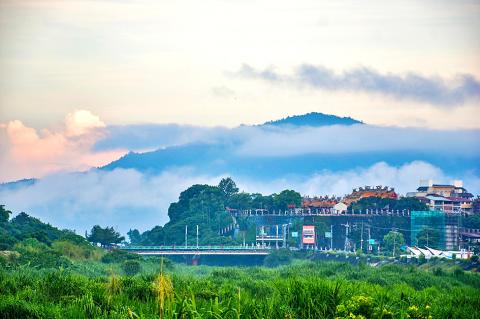Taiwan has again been voted as the best place for expatriates to live, after claiming the top spot three years ago, thanks to its good healthcare, quality of life and job environment, a survey by the expatriate networking Web site InterNations found.
Respondents to the Expat Insider survey by Munich, Germany-based InterNations this year selected Taiwan as the top destination for expatriates, with an overall satisfaction rate of 86 percent from those living in the nation, compared with an average of 75 percent from expatriates living in the other nations surveyed.
Taiwan last year ranked second and fourth in 2017, after topping the survey in 2016.

Photo courtesy of Chen Chi-yuan
The survey asked more than 20,000 expatriates how satisfied they were with their quality of life, ease of settling in, working life, personal finances, cost of living and family life in 64 destinations worldwide.
“Taiwan offers great variety for such a small island. Nature, the culture and the people are very friendly,” said a video on the InterNations Web site introducing the survey.
Taiwan ranked third in quality of life — with 96 percent of respondents in the nation satisfied with the level of personal safety — sixth in personal finances, eighth in working life, 11th in cost of living and 14th in ease of settling in.

Photo: Cheng Ming-hsiang, Taipei Times
As only 9 percent of respondents were raising children, there were not enough expatriate parents to rank Taiwan in the family life index, InterNations said.
Nearly 92 percent of respondents living in Taiwan agreed that the nation has a high level of medical care, while 89 percent were satisfied with its affordability, the survey showed.
“No other destination has performed better on quality or affordability since Taiwan entered the survey,” InterNations said.
Taiwan ranked second on career prospects for expatriates, with 65 percent of respondents saying that they were satisfied.
The expatriates’ high satisfaction in many areas was somewhat offset by their dissatisfaction with pollution in Taiwan — the nation ranked 35th on quality of the environment — and difficulty learning the local language — 52 percent of respondents said that they were struggling with learning Chinese.
This year’s No. 2 destination for expatriates was Vietnam, followed by Portugal, Mexico, Spain, Singapore, Bahrain, Ecuador, Malaysia and the Czech Republic.
The least favorable destinations were Kuwait, Italy, Nigeria, Brazil, Turkey, India, the UK, Greece, Russia and South Korea.

Right-wing political scientist Laura Fernandez on Sunday won Costa Rica’s presidential election by a landslide, after promising to crack down on rising violence linked to the cocaine trade. Fernandez’s nearest rival, economist Alvaro Ramos, conceded defeat as results showed the ruling party far exceeding the threshold of 40 percent needed to avoid a runoff. With 94 percent of polling stations counted, the political heir of outgoing Costa Rican President Rodrigo Chaves had captured 48.3 percent of the vote compared with Ramos’ 33.4 percent, the Supreme Electoral Tribunal said. As soon as the first results were announced, members of Fernandez’s Sovereign People’s Party

EMERGING FIELDS: The Chinese president said that the two countries would explore cooperation in green technology, the digital economy and artificial intelligence Chinese President Xi Jinping (習近平) yesterday called for an “equal and orderly multipolar world” in the face of “unilateral bullying,” in an apparent jab at the US. Xi was speaking during talks in Beijing with Uruguayan President Yamandu Orsi, the first South American leader to visit China since US special forces captured then-Venezuelan president Nicolas Maduro last month — an operation that Beijing condemned as a violation of sovereignty. Orsi follows a slew of leaders to have visited China seeking to boost ties with the world’s second-largest economy to hedge against US President Donald Trump’s increasingly unpredictable administration. “The international situation is fraught

MORE RESPONSIBILITY: Draftees would be expected to fight alongside professional soldiers, likely requiring the transformation of some training brigades into combat units The armed forces are to start incorporating new conscripts into combined arms brigades this year to enhance combat readiness, the Executive Yuan’s latest policy report said. The new policy would affect Taiwanese men entering the military for their compulsory service, which was extended to one year under reforms by then-president Tsai Ing-wen (蔡英文) in 2022. The conscripts would be trained to operate machine guns, uncrewed aerial vehicles, anti-tank guided missile launchers and Stinger air defense systems, the report said, adding that the basic training would be lengthened to eight weeks. After basic training, conscripts would be sorted into infantry battalions that would take

GROWING AMBITIONS: The scale and tempo of the operations show that the Strait has become the core theater for China to expand its security interests, the report said Chinese military aircraft incursions around Taiwan have surged nearly 15-fold over the past five years, according to a report released yesterday by the Democratic Progressive Party’s (DPP) Department of China Affairs. Sorties in the Taiwan Strait were previously irregular, totaling 380 in 2020, but have since evolved into routine operations, the report showed. “This demonstrates that the Taiwan Strait has become both the starting point and testing ground for Beijing’s expansionist ambitions,” it said. Driven by military expansionism, China is systematically pursuing actions aimed at altering the regional “status quo,” the department said, adding that Taiwan represents the most critical link in China’s